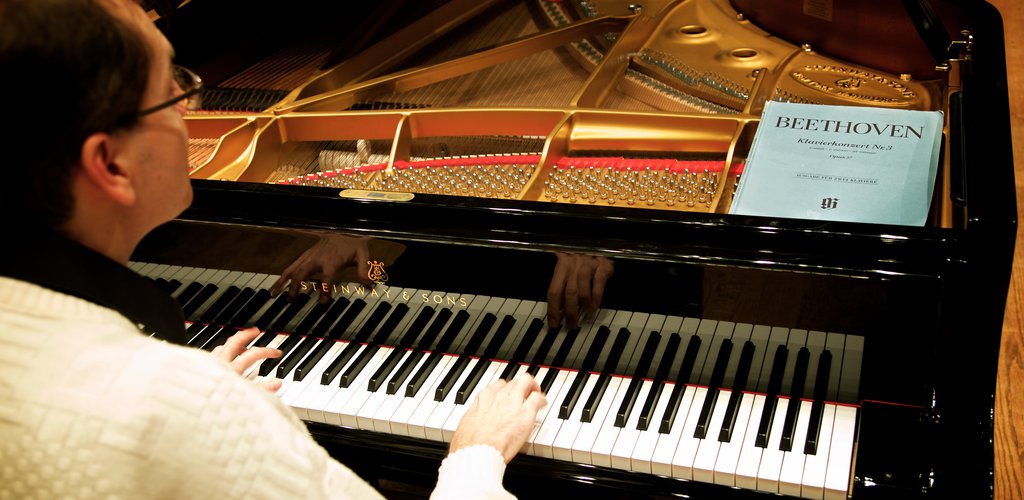Beethoven as you’ve never heard him before
Concert by the Budapest Festival Orchestra
Programme:
• Bach – Suite in B minor (BWV 1067)
• Beethoven – Piano Concerto No. 3 in C minor
• Rachmaninoff – Symphony No. 2 in E minor
Conductor: Iván Fischer
Piano: Dénes Várjon
Almost every season, it seems that the Festival Orchestra must contend with a conductor or soloist who falls ill. Last January, it was Paavo Järvi who was forced to cancel his performance with the orchestra; this year, pianist Radu Lupu succumbed to illness. But not to worry! Just as last year, we were once again treated to an excellent “substitute” this year. And, in fact, the programme this time has changed in the weeks immediately preceding the concert. But we certainly did not end up faring any worse! The concert programme we heard at Müpa Budapest on 21, 22 and 23 January was the same line-up of the orchestra that had international critics raving prior to the performances in Budapest. And once again, the international praise was not unfounded, even though this ultimately became clear to me only at the end of the Beethoven piano concerto.
The concert began with a performance of Bach’s Suite in B minor, performed by the orchestra’s early music “contingent,” featuring Iván Fischer on the continuo organ. It is beyond doubt that the BFO excels in performing Baroque and early music – I have one specific Baroque concert of theirs in mind, which I heard at the Liszt Academy and also evinced as much. But as far as a concert “overture,” I did not find this piece by Bach convincing. How did it relate to the other two composers featured on the programme? I was unable to answer this question myself; but perhaps it was all for the best, and at least provided an opportunity to hear another character in the orchestra, even if it seemed somewhat unnatural.
One thing I have learned over the course of my previous Festival Orchestra experiences is this: never judge a concert by your first impression. Even if the first piece does not always turn out perfectly, one of the ones following it always “saves” the concert. And that was precisely what happened that night. Beethoven’s Piano Concerto No. 3 did not simply save the concert: it propelled it into orbit! I admit to having had some reservations about the piece, for – despite the orchestra’s outstanding sound – I cannot seem to identify with Fischer’s interpretations of Beethoven. But what happened that night overrode all of my earlier experiences.
The orchestral first movement’s overture was free of the encumbrance of haze or vagueness. It was in fact rather taut. The orchestra opened up gradually, with their sound becoming almost fireworks-like. The entry of the piano solo was also free of any prior convention, joining forcefully and almost explosively. Dénes Várjon’s performance was clean and bright – but also “scratched” and forceful at times. From that point on, I had forgotten what I was listening to. Everything was new. The familiar piece turned into a tough but enjoyable game of chess, where I could never predict the move of my partner opposite me. The sound of the orchestra was amazing. Fischer played with the orchestral parts beautifully, and the well-designed tempos and crescendos provided for surprises throughout. The piece demonstrated the perfectionist approach and “engineer-like precision” of the soloist and the conductor. Pure rubato.
Never before had I heard this piano concerto performed this way, and it would take a tremendous miracle for me to ever have the same experience again. And not least of all, my understanding of the interpretations of this piano concerto has changed significantly as a result. This piece of music, which had seemed simple and rational, is in fact far more, and is more interesting and more complex. It is possible to play with it – and that has always been a forte of the Festival Orchestra.
Before the second half of the concert, I was once again fighting my own preconceptions. As far as piano concertos and Rachmaninoff are concerned, I will gladly take any and all. But the symphony, as a genre, and Rachmaninoff... well, just give me Beethoven instead! And yet prejudices were once again overcome in the first movement.
This time, the introductory part benefitted from some haze. Slowly, the orchestra emerged, and the piece began to develop. We were once again able to let ourselves go. The miracle unfolded on the stage, and we became a part of it. This is a beautifully arranged symphony, and we eventually lost ourselves to the music. Again, more surprises! The passionately sweeping music of the piece led up almost imperceptibly to the finale. Is it really over already? Was that really it?
After all of this, it is clear why the programme had critics – and yours, truly – raving. If I were a social psychologist, I would coin the term “BFO flow” for concerts such as this one. A concert experience in every sense of the word. Experiencing perfection. Need I say more?
